MIT SCHOOL OF HUMANITIES, ARTS, AND SOCIAL SCIENCES
Media + Awards Digest | June 2020
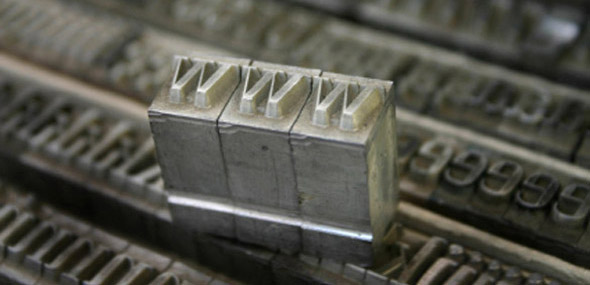
The Media + Awards Digest is a section of the Said and Done newsletter. Subscribe
Office of the Dean | June 2020
Dear Friends,
The coronavirus, systemic racism, a diminished economy, misinformation, voting during a pandemic, a divided political landscape — all of these challenges, turbulent are they are, confirm the urgent need for change: from creating a more coordinated public health infrastructure to practices that further enable, rather than suppress, voting.
In such a time, I am very grateful to our faculty for steadfast, effective media engagements to share ideas, research, and perspectives for the way forward. Our School’s disciplines are crucial for understanding and solving today's challenges, whether they involve subduing a virus that emerged in 2019 or dismantling systemic racism that stems from 1619.
To mention just a few of the recent media contributions: Charles Stewart III provides expertise on mail-in voting on NPR and in The Washington Post, and political scientist Andrea Campbell is interviewed by CNN about the uniquely American response to the coronavirus. MIT novelist and physicist Alan Lightman has a conversation with Oprah Winfrey to discuss the nature and meaning of spiritual experiences. Joel Brenner, former NSA inspector general and senior research fellow at the Center for International Studies, appears on WBUR’s "On Point" about the inspector general firings and their implications for American democracy.
On NPR, Jim Walsh, Senior Research Associate in the Security Studies Program, analyzes the administration's withdrawal from the Open Skies Treaty. Political scientist and SSP Director Taylor Fravel shares insight on China’s recent territorial disputes in The Wall Street Journal and The Washington Post.
The debate on Covid-19 economic implications and recovery continues. Quartz published an article covering a recent video presentation by economist David Autor, hosted by the National Bureau of Economic Research. A working paper on lockdown policies co-authored by Daron Acemoglu was covered in The Wall Street Journal and The New York Times. Finally, Jonathan Gruber continued regular appearances on WGBH Boston Public Radio, discussing the value of public financial assistance.
In addition to these contributions in the mainstream media, I know many in our community are discussing significant ideas and research on other platforms. I invite you to share news of your interviews, podcasts, op-eds, and other works with the Communications team in my office, so that we can help amplify them.
With every good wish to you and yours as summer begins,
Melissa
Melissa Nobles
Kenan Sahin Dean
Professor of Political Science
MIT School of Humanities, Arts, and Social Sciences
HONORS AND AWARDS
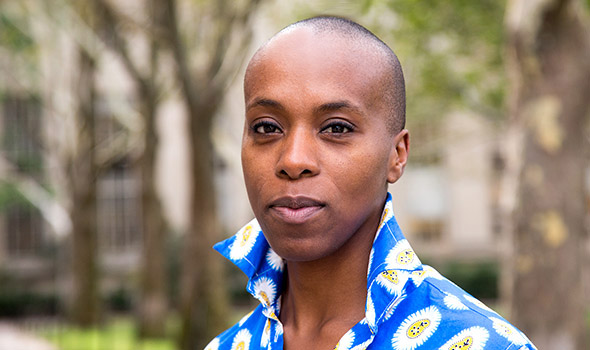
Amah Edoh, Assistant Professor of Anthropology and African Studies; photo by Jon Sachs, SHASS Communications
ANTHROPOLOGY
Amah Edoh receives Baker Award for Excellence in Undergraduate Teaching
This Institute-wide award is given annually to an MIT faculty member, recognizing an “exceptional interest and ability in the instruction of undergraduates.” It is the only teaching award in which the nomination and selection of the recipients is done entirely by students.
Story
LINGUISTICS
QS ranks MIT the world’s No. 1 university for 2020-21
Ranked at the top for the ninth straight year, the Institute also places first in 12 subject areas, including Linguistics.
Story | MIT Linguistics
CENTER FOR INTERNATIONAL STUDIES
Sara Plana receives inaugural Jeanne Guillemin Prize
The prize, which provides financial support to women working toward a PhD in international affairs, will be applied toward her research into proxy warfare.
Story at MIT News
POLITICAL SCIENCE
Professor Lily Tsai honored as “Committed to Caring”
Tsai, along with Professors Paola Cappellaro and Warren Seering, has been honored by graduate students as “Committed to Caring” for her adaptability and stable guidance as advisors, helping students weather setbacks and continue to find delight in discovery, even in the midst of a pandemic.
Story at MIT News
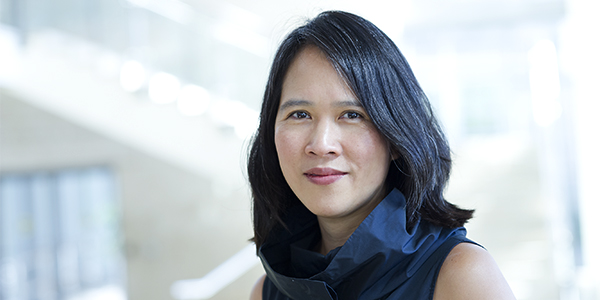
Lily Tsai, Associate Professor of Political Science; photo by Stuart Darsch
MEDIA BY DISCIPLINE
COMPARATIVE MEDIA STUDIES / WRITING
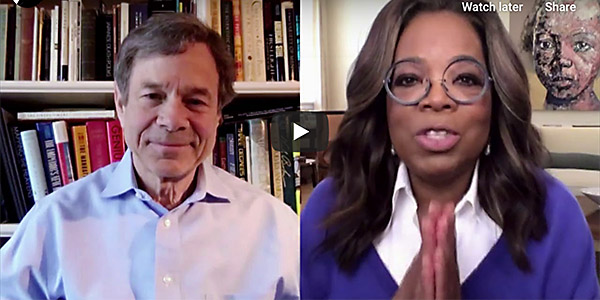
Alan Lightman and Oprah Winfrey, in conversation
OPRAH WINFREY'S 2020 VISION TOUR
A Conversation | Alan Lightman and Oprah Winfrey
In this conversation, part of Winfrey's 2020 Vision Tour, Oprah talks with MIT physicist and writer Alan Lightman about the presence, authenticity, and meanings of spiritual experience.
Watch video
POLITICAL SCIENCE / SECURITY STUDIES PROGRAM

The Open Skies Treaty came into force in 2002; photo via Organization for Security and Co-operation in Europe
WBUR
Mattis calls out clearing protesters 'abuse of executive authority' | Jim Walsh
Former Secretary of Defense James Mattis has called the decision to clear peaceful protesters from outside the White House this week an "abuse of executive authority." Host Jeremy Hobson speaks with Jim Walsh, Here & Now security analyst and a senior research associate at Massachusetts Institute of Technology's Security Studies Program.
Conversation at WBUR
WBUR
US pulls out of Open Skies Treaty | Jim Walsh
The United States is pulling out of the Open Skies Treaty, the third major security accord the Trump Administration has scuttled. Dr. Walsh speaks to Jeremy Hobson of Here & Now about the U.S. pulling out of the Open Skies Treaty.
Conversation at WBUR | Walsh webpage
BOOK AUTHORITY
Active Defense named one of the best China histories for 2020 | Taylor Fravel
Fravel’s book Active Defense about China's military strategy has been named one of Book Authority's best new China histories for 2020. Fravel is the Arthur and Ruth Sloan Professor of Political Science and Director of the MIT Security Studies Program.
Fravel website | Books | About Active Defense
THE WALL STREET JOURNAL
China picks a border fight with India | Taylor Fravel
For now, the odds of escalation appear slim. India and China fought a brief and bitter border war in 1962 and have failed to agree to a mutually recognized border despite more than 20 rounds of talks. M. Fravel, a political scientist and China expert, says “putting the border dispute in a box” has been “the great success of the India-China relationship.”
Story at The Wall Street Journal
BBC
India-China clash: An extraordinary escalation 'with rocks and clubs' | Vipin Narang
"Once fatalities are sustained, keeping everything quiet becomes hard on both sides. Now public pressure becomes a variable," Dr Narang, a security studies professor at Massachusetts Institute of Technology, told me. "The scale, scope and swathe of the pressure across the border is seemingly unprecedented."
Story at the BBC
VOX
India and China just had their deadliest clash since the 1960s
“The best-case scenario is they use this incident as a wake-up call to shock them into solving this [border fight] once and for all,” Narang, an expert on Indian forces at MIT, said. “The worst case is the nationalists push to escalate and it'll be a long, long summer.”...That still holds, as a war between two large nations with nuclear weapons could get out of hand very quickly. “Neither side has an incentive for this to escalate,” said Narang.
Story at Vox
LINGUISTICS
PHILOSOPHICAL TRIALS PODCAST
On Language, Semantics, and Possible Worlds | Kai von Fintel
“I think the most amazing thing about language is its open-endedness, its creativity. You can convey any kind of meaning that you want with language. It gives you the tools to do that. And it doesn’t really restrict the range of things that you can talk about. Language gives us access to an infinite set of meanings. That’s an amazing fact, given that we are finite beings.”
Conversation via YouTube
POLITICAL SCIENCE / CENTER FOR INTERNATIONAL STUDIES
WBUR
What do the Inspector General firings say about American democracy? | Joel Brenner
Brenner, Senior Research Fellow at MIT's Center for International Studies, shares his experience as inspector general and discusses the president's firing of at least five inspectors general. Brenner is former inspector general for the National Security Agency, and later senior counsel to the NSA.
Conversation at WBUR | Brenner Webpage
SCIENCE, TECHNOLOGY, AND SOCIETY
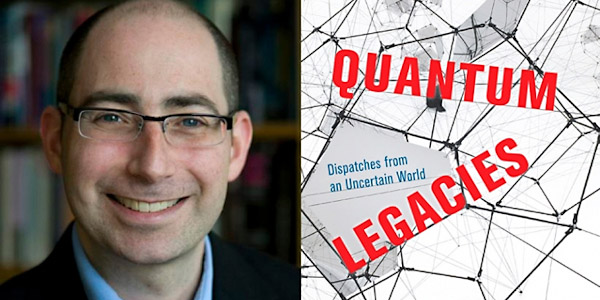
David Kaiser; photo by Donna Coveney
FORBES
Book Review: Quantum Legacies, by David Kaiser
"All in all, this is a very solid work both in terms of the history and the physics discussed in it, and Kaiser is a very engaging writer. As you would expect from an actual (albeit part-time) historian, the pieces are also extensively documented with citations of the original sources."
Review at Forbes | Kaiser Webpage
PANDEMIC RELATED MEDIA PUBLICATIONS
At-A-Glance List of Pandemic-related Media Publications from MIT SHASS
An ongoing list of commentaries from our School community to inform policy and to increase public understanding of the pandemic.
Collected Publications
CIVIC PERSPECTIVES AND DAILY LIFE
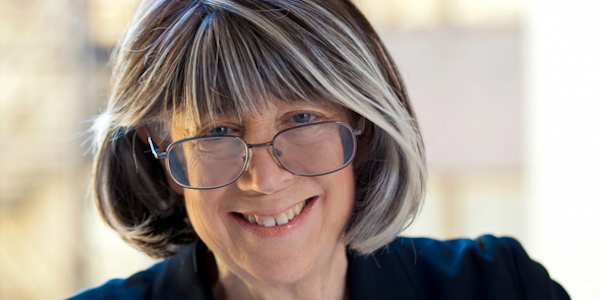
Professor Susan Silbey; photo by Jon Sachs, MIT-SHASS Communications
THE GUARDIAN
Humans are not resources. Coronavirus shows why we must democratise work
In a letter co-signed by MIT Anthropology Professor Susan Silbey, scholars declare that "Working humans are so much more than 'resources.' This is one of the central lessons of the current crisis. ...Human health and the care of the most vulnerable cannot be governed by market forces alone."
Letter at The Guardian
FOX 25
Volunteers agree to be injected with coronavirus to speed vaccine | Ellie Immerman
MIT-HASTS graduate student Ellie Immerman is one of the group's volunteers. “Being young and healthy, I'd much prefer that I get the virus then that someone else does, and that we develop a vaccine much faster,” Immerman said.
Story at Fox 25
THE NEW YORK TIMES
How to have a fun conversation again | Sherry Turkle
The MIT professor and author of Reclaiming Conversation: The Power of Talk in a Digital Age wants to talk about everything she's been doing to adjust in this new normal. “Similarly,” she said, “my quarantine-mates are doing the most fascinating work in business, finance, strategy and thinking about the future of human resources, hiring and marketing.”
Story at The New York Times
A SAFE AND SECURE 2020 ELECTION 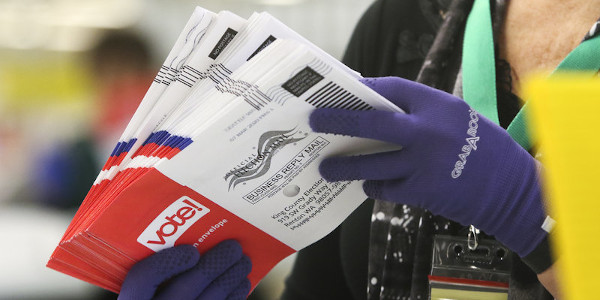
An election worker sorts vote-by-mail ballots; photo by Jason Redmond/AFP via Getty Images
NPR | NATIONAL PUBLIC RADIO
Why is voting by mail (suddenly) controversial? | Charles Stewart
The practice dates back to the Civil War, according to MIT's Election Data Lab, when soldiers were given the opportunity to vote from the battlefield. States began expanding absentee voting laws in the late 1800s to accommodate voters who were away from home or sick on Election Day.
Story at NPR
WASHINGTON POST
Mail-in ballots have much higher rates of not being counted | Charles Stewart
A Massachusetts Institute of Technology study found that in the 2008 presidential election, 7.6 million of 35.5 million mail-in ballots requested were not counted because they never reached voters or were rejected for irregularities. That is a failure rate of more than 21 percent.
Opinion at The Washington Post
BLOOMBERG GOVERNMENT
Trump’s mail-in voting fraud claims draw Republican critics | MIT Election Lab
That could fuel allegations of fraud and official manipulation such as systematic miscounting, said Nathaniel Persily, a Stanford Law professor leading the Stanford-MIT Project on a Healthy Election.
Story at Bloomberg Government
THE NEW YORK TIMES
Georgia havoc raises new doubts on pricey voting machines | Charles Stewart
“The problem seems to have been a perfect storm (overused metaphor, but apt here) of new equipment, hasty training and a crush of tasks associated with both getting the mail ballots out the door and processed AND with running an in-person voting operation.”
Story at The New York Times
DOMESTIC POLITICS
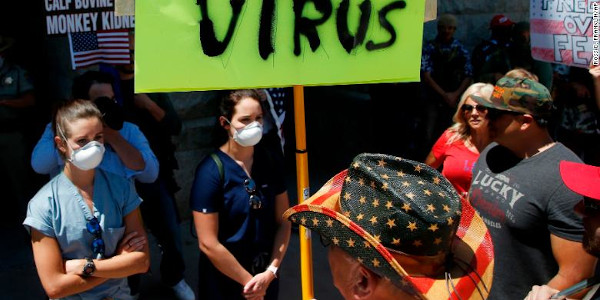
Image via CNN
CNN
American exceptionalism and its response to the coronavirus | Andrea Campbell
"It's always been the orientation of America on balance, compared to other countries, to put a priority on individual freedom and liberty," says Andrea Campbell, a professor of political science at the Massachusetts Institute of Technology who studies the intersection of politics and public health..."Americans have this very strong sense of American exceptionalism — that the US is different than other countries and superior in many ways," Campbell says.
Story at CNN
ECONOMIC MATTERS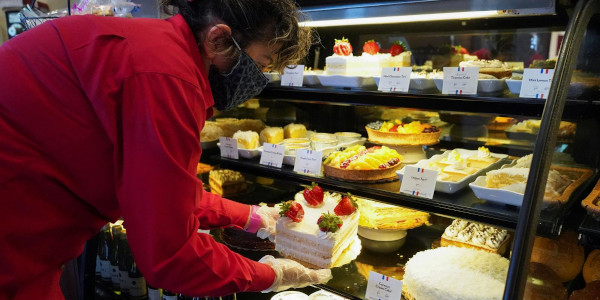
Flory Ramirez at La Madeleine restaurant wears a mask while handling cakes in Houston, Texas; photo by REUTERS/Go Nakamura
FAST COMPANY
Bill Gates: 5 books for the pandemic summer | Abhijit Banerjee, Esther Duflo
Gates' annual reading list features Good Economics for Hard Times: Banerjee and Duflo, Nobel Prize-winning economists at MIT who pioneered the use of randomized controlled trials to study the impact of policies like direct cash transfer, wrote this book to examine the latest research on major issues like immigration, climate change, and inequality.
Full commentary at Fast Company
REUTERS
How will The Fed know things are better? | Jeffrey Harris
Harris, a physician and economics professor, noted the main methods for tracking progress against the virus had all failed in one jurisdiction or another. “We will have more than a few problems trying to determine whether various state governments' efforts to rekindle economic and social activity have been working or failing.”
Story at Reuters
FAST COMPANY
6 experts on how capitalism will emerge after COVID-19 | David Autor
There are two aspects of [the COVID-19 crisis]. One is in the short term: Who’s bearing the burden, and how can it possibly be reduced to some degree? The second is in the long run: What does this mean for the structure of earnings and employment and opportunity for those same groups of workers?
Commentary at Fast Company
THE NEW YORK TIMES
The economy is experiencing an epic collapse of demand | Iván Werning
What started as a disruption to the supply side of the economy has metastasized into a collapse of the demand side, she and co-authors say in a recent working paper. They call it a Keynesian supply shock. “Demand is interrelated with supply,” said Iván Werning, an MIT economist and a co-author of the paper. “It's not a separate concept.”
Story at The New York Times
QUARTZ
The Covid-19 pandemic will be a disaster for wages | David Autor
The coronavirus pandemic will significantly change the labor market and be a disaster for the lowest-paid workers in the United States, according to Autor. There will be a permanent downward shift in the amount of the US gross domestic product paid out in wages, salaries and benefits by 1 or 2 percentage points, Autor predicted.
Story at Quartz
AXIOS
How science can prepare us for the next crisis | Esther Duflo
"Esther Duflo from MIT took a scientific idea, randomized control trials and applied it to the world of policy. ... I think we could take those kinds of instruments and say here are good tools for everybody, even if you're not a scientist, to look at data and make decisions for policy...[G]ood scientific thinking is good thinking."
Story at Axios
FREAKONOMICS
Which jobs will come back and when? | Daron Acemoglu
"If you think about what the British Industrial Revolution was, it was a slew of automation technologies...We always equated Luddites with irrationality or being anti-technology. But actually, when you look at the details, the Luddites weren't exactly wrong. They understood that they were losing their jobs, and there's a reason for it."
Commentary at Freakonomics
THE WALL STREET JOURNAL
New York starts mapping out the road back from coronavirus | Jeffrey Harris
Harris, examining the correlation between turnstile entries and infection rates, concluded New York subways helped propagate the crisis early on. The Metropolitan Transportation Authority said the transit system helped get doctors and nurses to work.
Story at The Wall Street Journal
THE WALL STREET JOURNAL
A lost decade | Daron Acemoglu, Iván Werning
One size doesn't fit all in a coronavirus lockdown. "Better social outcomes are possible with targeted policies. Differential lockdowns on groups with differential risks can significantly improve policy trade-offs, enabling large reductions in economic damages or excess deaths or both."
Coverage at The Wall Street Journal
QUARTZ
Retail is one of the biggest US employers and desperately needs help | David Autor
Autor recently predicted the sector's contraction will be “vastly accelerated” by the fallout from Covid-19, and as demand falls for the sort of in-person services most affected in the outbreak, the low-wage workers doing these jobs will see their wages decline. Groups such as black and Latino Americans could be hit hardest.
Story at Quartz

Oliver E. Williamson after being awarded the Nobel Prize in Economics; photo by Paul Sakuma/AP
IN MEMORIAM
Oliver Williamson '55, Nobel Laureate in Economics
Williamson, an economist whose groundbreaking work on analyzing the structure of organizations was honored with the 2009 Nobel Memorial Prize in Economic Sciences, died on May 21 in Oakland, Calif. He was 87. Williamson had had a rich and peripatetic academic career, studying or teaching at some of the nation’s most prominent universities, including the Massachusetts Institute of Technology, Stanford, Carnegie-Mellon, Yale, and the University of Pennsylvania.
Obituary at The New York Times
The Media + Awards Digest is a section
of Said and Done, the School's online digest.
EXPLORE
Follow us




Subscribe to Said and Done
10 issues a year
Research
Impact
MIT SHASS Research + Perspectives for the Pandemic
Website
Solving Climate: Humanistic Perspectives from MIT
Browse the Series
Ethics, Computing, and AI: Perspectives from MIT
Browse the Series
Computing and AI: Humanistic Perspectives from MIT
Browse the Series
MIT Climate website | Humanistic research
A major source of research, innovation, and discussion
Join us!
SHASS on MIT News
Research and Features
MIT Campaign for a Better World
Story | Join Us

Published by SHASS Communications
Office of the Dean, MIT School of Humanities, Arts, and Social Sciences
Editor and Designer: Emily Hiestand
Publication Associate: Alison Lanier
Media Relations Manager: Stephen Oakes
Published 18 June 2020